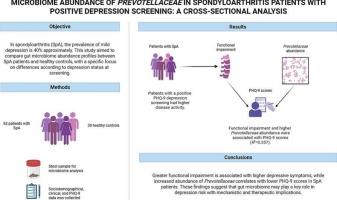Microbiome abundance of Prevotellaceae in spondyloarthritis patients with positive depression screening: A cross-sectional analysis
IF 3.3
2区 医学
Q2 PSYCHIATRY
引用次数: 0
Abstract
Introduction
Patients with autoimmune/autoinflammatory diseases are at increased risk for major depressive disorder. In spondyloarthritis (SpA), the prevalence of mild depression is 40 % approximately. This study aimed to assess the differences in gut microbiome abundance profiles between control subjects and patients with SpA, as well as between patients with positive and negative depression screening.
Methods
Patients fulfilling the ASAS criteria for SpA and matched controls were included. Sociodemographic and clinical data were collected, including disease activity and functional impairment assessments. Stool samples were obtained for DNA extraction, 16S rRNA PCR amplification with MiSeq sequencing to determine microbiome profiles. All patients completed the PHQ-9, and a linear regression model was developed to assess associations, adjusting for age, sex, and disease factors.
Results
62 SpA patients and 30 controls were included. Patients presented more frequently gastrointestinal symptoms and elevated inflammatory markers. Patients with a positive PHQ-9 depression screening had higher disease activity (ASDAS-CRP median 3.05; IQR 2.70 to 3.50 vs. 2.30; IQR 1.35 to 2.90) and greater functional impairment (BASFI median 6.55; IQR 5.50 to 7.60 vs. 2.50; IQR 0.80 to 4.20). Microbiome analysis revealed differences according to depression screening. Regression analysis confirmed that greater functional impairment and higher Prevotellaceae abundance were associated with PHQ-9 scores (R2 = 0.557).
Conclusion
Greater functional impairment is associated with higher depressive symptoms, while increased abundance of Prevotellaceae correlates with lower PHQ-9 scores in SpA patients. These findings suggest that gut microbiome may play a key role in depression risk with mechanistic and therapeutic implications.

抑郁症筛查阳性的脊柱关节炎患者中Prevotellaceae菌群的丰度:横断面分析
自身免疫/自身炎症性疾病患者患重度抑郁障碍的风险增加。在脊椎关节炎(SpA)中,轻度抑郁的患病率约为40%。本研究旨在评估对照组和SpA患者之间,以及阳性和阴性抑郁症筛查患者之间肠道微生物群丰度的差异。方法纳入符合ASAS SpA标准的患者和匹配的对照组。收集社会人口学和临床数据,包括疾病活动和功能损害评估。取粪便样本进行DNA提取,16S rRNA PCR扩增,MiSeq测序,确定微生物组谱。所有患者都完成了PHQ-9,并建立了一个线性回归模型来评估相关性,调整了年龄、性别和疾病因素。结果纳入SpA患者62例,对照组30例。患者表现出更频繁的胃肠道症状和炎症标志物升高。PHQ-9抑郁症筛查阳性的患者有较高的疾病活动性(ASDAS-CRP中位数为3.05;IQR为2.70至3.50 vs. 2.30; IQR为1.35至2.90)和较大的功能障碍(BASFI中位数为6.55;IQR为5.50至7.60 vs. 2.50; IQR为0.80至4.20)。微生物组分析显示了抑郁症筛查的差异。回归分析证实,PHQ-9评分与功能损伤程度和普氏菌科丰度呈正相关(R2 = 0.557)。结论SpA患者的功能损害程度越大,抑郁症状越严重,而普氏菌科丰富度的增加与PHQ-9评分的降低相关。这些发现表明,肠道微生物群可能在抑郁症风险中发挥关键作用,具有机制和治疗意义。
本文章由计算机程序翻译,如有差异,请以英文原文为准。
求助全文
约1分钟内获得全文
求助全文
来源期刊
CiteScore
7.40
自引率
6.40%
发文量
314
审稿时长
6.2 weeks
期刊介绍:
The Journal of Psychosomatic Research is a multidisciplinary research journal covering all aspects of the relationships between psychology and medicine. The scope is broad and ranges from basic human biological and psychological research to evaluations of treatment and services. Papers will normally be concerned with illness or patients rather than studies of healthy populations. Studies concerning special populations, such as the elderly and children and adolescents, are welcome. In addition to peer-reviewed original papers, the journal publishes editorials, reviews, and other papers related to the journal''s aims.

 求助内容:
求助内容: 应助结果提醒方式:
应助结果提醒方式:


